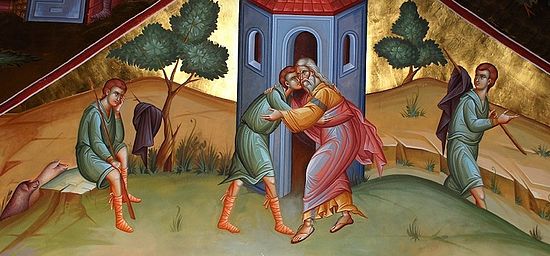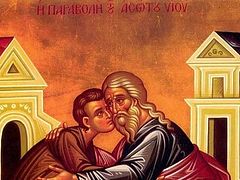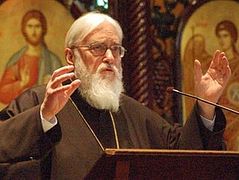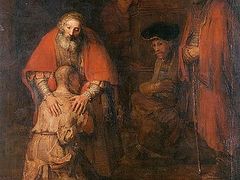
In the Name of the Father, the Son and the Holy Spirit.
How simple and how restrained are the words in which the Gospel describes his cruel rejection of his father, and prepares his departure into the far, strange country! “Father, give me my part of thy inheritance!” Do these words not mean: “Father, I can’t wait until your death! You are still strong, and I am young; it is now that I want to reap the fruits of thy life, of thy labors; later they will grow stale. Let us come to an agreement: for me you are dead; give me what belongs to me or what would belong to me after your actual death, and I will go, and I will live the life I have chosen.”
This is what the young man really meant; but isn’t it very much the way we treat God and His gifts? As long as we are with Him we are in possession of all things, but we feel constrained by His presence, we feel limited by the inevitable rules of His household: He expects from us integrity and truth. He expects from us to learn from Him what it means to love with all our mind, all our heart, all our strength, and all our being—and that is too much for us. And we take all His gifts, and we turn away from Him to use these gifts so that they can profit us, and us alone, without any returns either to God, or to anyone else.
We all, without any exception but in different degrees obey the cruel, deceitful question of satan to Christ in the wilderness! You have the power to do it—make these stones to become bread; You are God’s child—use what God has given you of wisdom, of strength, use it for you own benefit! Why waste your time waiting until you are too old? Isn’t this a picture of our own behavior?
And then the young man leaves; he leaves for an alien country, a country that is not God’s own, a country that has rejected God, renounced God, that has been betrayed into the power of His adversary, a country where there is no place for God. And he lives according to the rules of this country and the desires of his heart. And then, hunger comes.
Now, we turn away, carrying with us the gifts of God; and we live in a country that is also alien; we live in a world that is man-made, but not God-made, or rather made by God and distorted by man. What kind of hunger comes to us? We are rich, we are safe, we have everything God gave us and continues to give us—only we don’t realize that God continues to give while we squander. But what is the hunger that can come to us? The awareness that Christ describes in the first Beatitude: Blessed are the poor in spirit, theirs is the Kingdom of God... Who are the poor in spirit? The poor in spirit are those who have understood, and understand day in, day out, throughout their lives that they have no existence except that God loved us into existence; we have no life except God’s life poured into us, His breath, the breath of life. And then we are so rich, because God has revealed Himself to us. He has revealed Who He is—we can love Him, know Him, worship Him, serve Him, and emulate Him because He has become man and has shown us what a man can be. And He has given us all our intelligence, a heart, a will, a body, the world around us, the people around us, the relationships that are ours—all these are God’s, because we cannot make them, we cannot force anyone to love us, and yet, we have friends and people who love us. We cannot be sure of our mind: in one moment a stroke can extinguish the greatest mind; there are moments when we want to respond to a need, to a suffering, and our heart is of stone; only God can give it life! We waver between good and evil, and only God can steady our will....
If we only realize this, then we will understand that we are totally destitute; we are nothing, we have nothing, and yet, we are so rich. Although destitute, we are endowed with all the gifts of God. Having betrayed Him and turned away from Him time and again, we still are loved by Him. Indeed, “blessed are the hungry, for they shall be filled”! If we would only realize our hunger for the real things, then they will come our way. But not simply because we are hungry—they will come our way at a moment when we are totally poor, yet we are loved—and this is the Kingdom of God, a Kingdom of love. God loves us. And He has granted the gift of love to each of us. The young man felt hungry. He felt hungry for his father’s home, and yet he knew that he had no right anymore to call himself his son. He was a murderer! He had told him, “Die before your time that I may live according to my will...” And yet he goes, because he can still call the man whom he rejected, “Father”.
And what happens then? The father sees him coming from afar off. He does not wait in dignity for him to fall at his feet and confess his sins. He rushes towards him, he embraces him! And the young man makes his confession: “I am no longer worthy to be called thy son.” But at that moment the father stops him. “You may not be worthy of being my son, and yet you are my son, and you cannot become a hireling in you father’s house... He demands from him as God demands from us—that we should be aware, and grow to the level of our human greatness, to be the children of the Living God called to be partakers of the divine nature, His sons and daughters in Christ and in the Spirit.
That is what this parable tells us, that is what we must reflect on. Where do we stand in relation to the first, simple, cruel, murderous words of the young man? And are we aware of our prodigality? Are we hungry enough to realize that we must go home to the only One who loves us, and Who, seeing us fallen, still recognizes in us the greatness of sonship?
Let us reflect on this. It’s one more step towards the day when we will come in repentance to make our confession, and receive forgiveness. And if we were honest in our repentance, determined in our turning to God, we will be at home, and ready to enter into Holy week together with Christ the Son, together with the Father Who gives His Son, together with the Mother of God Who accepts the death upon the cross of Her Son, that we may be saved. Amen



